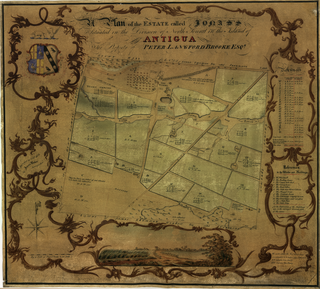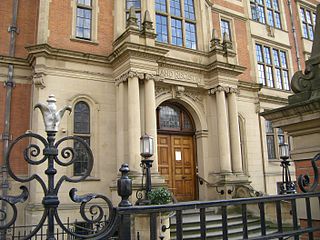A mortgage is a legal instrument which is used to create a security interest in real property held by a lender as a security for a debt, usually a loan of money. A mortgage in itself is not a debt, it is the lender's security for a debt. It is a transfer of an interest in land from the owner to the mortgage lender, on the condition that this interest will be returned to the owner when the terms of the mortgage have been satisfied or performed. In other words, the mortgage is a security for the loan that the lender makes to the borrower.

Foreclosure is a legal process in which a lender attempts to recover the balance of a loan from a borrower who has stopped making payments to the lender by forcing the sale of the asset used as the collateral for the loan.
Birmingham Midshires Mortgage Services Limited v Sabherwal [2000] 80 P&CR 256 is an English property law case, concerning the principles of equitable interests, overriding interests, and overreaching interests. It is one of many cases where the commercial rights mortgage lenders need to do business clash with the rights of innocent parties facing the loss of their home.

Lloyds Bank plc v Rosset[1990] UKHL 14 is an English land law, trusts law and matrimonial law case. It specifically deals with the translation into money of physical contributions from a cohabitee or spouse, under which its principles have been largely superseded.

Gissing v Gissing [1970] UKHL 3 is an English land law and trust law case dealing with constructive trusts arising in relationships between married couple. It may no longer represent good law, since the decisions of Stack v Dowden and Jones v Kernott.

Smith v Eric S Bush [1990] UKHL 1 is an English tort law and contract law case, heard by the House of Lords. First, it concerned the existence of a duty of care in tort for negligent misstatements, not made directly to someone relying on the statement. Second, it concerned the reasonableness of a term excluding liability under the Unfair Contract Terms Act 1977, s 2(2) and s 11.
Note in the UK a lender can take possession of a person's home due to default on a mortgage. This process is incorrectly often known as mortgage repossession; however assets can only be repossessed if the lender was the seller, which is often the case with cars but not usually houses. The correct terminology is possession. The process typically involves obtaining firstly an order for possession in the courts, then an eviction warrant. The eviction is carried out by bailiffs. Once the lender has obtained possession, it can then sell the home to recoup any lost arrears.

City of London Building Society v Flegg[1987] UKHL 6 is an English land law case decided in the House of Lords on the relationship between potential overriding interests and the concept of overreaching.

Unregistered land in English law is land that has not been registered with HM Land Registry. Under the residual principles of English land law, for unregistered land proof of title is based upon historical title deeds and a registry for certain charges under the Land Charges Act 1972.

Vernon v Bethell (1762) 28 ER 838 is an English property law case, where it was affirmed that there could be no clog on the equity of redemption. In justifying this rule, Lord Henley LC made the famous observation that,
necessitous men are not, truly speaking, free men, but, to answer a present exigency, will submit to any terms that the crafty may impose upon them.

English land law is the law of real property in England and Wales. Because of its heavy historical and social significance, land is usually seen as the most important part of English property law. Ownership of land has its roots in the feudal system established by William the Conqueror after 1066, and with a gradually diminishing aristocratic presence, now sees a large number of owners playing in an active market for real estate. The modern law's sources derive from the old courts of common law and equity, along with legislation such as the Law of Property Act 1925, the Settled Land Act 1925, the Land Charges Act 1972, the Trusts of Land and Appointment of Trustees Act 1996 and the Land Registration Act 2002. At its core, English land law involves the acquisition, content and priority of rights and obligations among people with interests in land. Having a property right in land, as opposed to a contractual or some other personal right, matters because it creates privileges over other people's claims, particularly if the land is sold on, the possessor goes insolvent, or when claiming various remedies, like specific performance, in court.

Kreglinger v New Patagonia Meat & Cold Storage Co Ltd[1913] UKHL 1 is an English property law and UK insolvency law case, concerning whether an exclusivity agreement for buying sheepskins, that accompanied a loan, frustrated the borrower's right to pay off and discharge its debt.
Link Lending Ltd v Bustard [2010] EWCA Civ 424 is an English land law case, concerning actual occupation in registered land and the vulnerable, in this case a defrauded person suffering from a mental syndrome who would have had little concept of what was occurring.

National Provincial Bank Ltd v Ainsworth [1965] is an English land law and family law case, concerning the quality of a person's interest in a home when people live together, as well as licenses in land.

Cuckmere Brick Co v Mutual Finance[1971] EWCA Civ 9 is an English tort law case, establishing the lender must publish/promote the materially beneficial key, intrinsic facts as to land in mortgage repossession sales. As it affects the duty of mortgagees, to that extent it can be considered within the periphery of English land law also.

Ropaigealach v Barclays Bank plc [2000] QB 263 is an English land law case, concerning mortgage arrears and a rare mortgage over a family home which had a right to enter a home and sell it without a court order.
Mortgages in English law are a method of raising capital through a loan contract. Typically with a bank, the lender/mortgagee gives money to the borrower/mortgagor, who uses their property/land/home as security that they will repay the debt and any relevant interest. If the mortgagor fails to repay, then the mortgaged property which has been used as security may be subject to various mortgagee remedies allowing them to retrieve the debt. Mortgages are an important part of English land law and property law. These concern, first, the common law, statutory and regulatory rules to protect the mortgagor at the time of concluding the mortgage agreement. Second, English law defines and restricts the process for taking possession of property in the event of default. Third, it places duties on mortgagees on the price it achieves when selling property.

Registered land in English law accounts for around 88 per cent of the total land mass. Since 1925, English land law has required that proprietary interests in land be registered, except in cases where it is necessary to protect social or family interests that cannot reasonably be expected to be registered. English law also runs a parallel system for around 12 per cent of land that remains unregistered.

Thompson v Foy[2009] EWHC 1076 (Ch) is an English land law case concerning the right of a person with an overriding interest in a home and deals with a family arrangement for a house to be a gift transferring from a mother to a daughter and the trust between the two parties that the daughter would pay the mother her sum to buy out her share of the property.

Holroyd v Marshall (1862) 10 HLC 191, 11 ER 999 was a judicial decision of the House of Lords. In that case the House of Lords affirmed that under English law a person could grant a mortgage or other security interest over future property, ie. property that they did not actually own at the time of granting the charge. Prior to decision, the generally accepted principle under English law was that pursuant to the nemo dat rule it was impossible for a person to convey a security interest in property which they did not own at the time of granting the charge.













